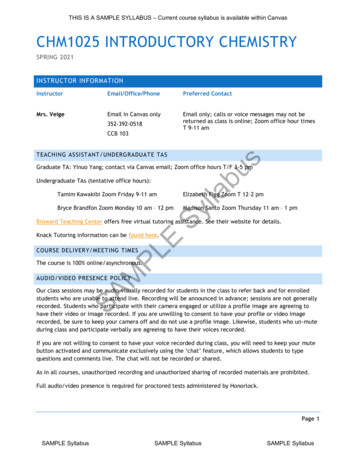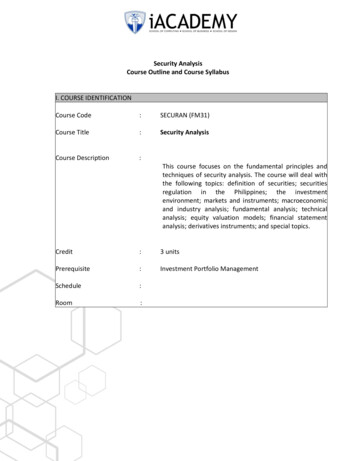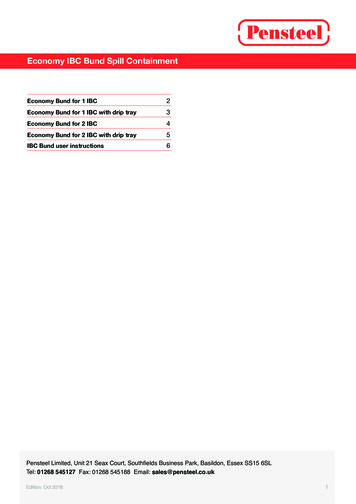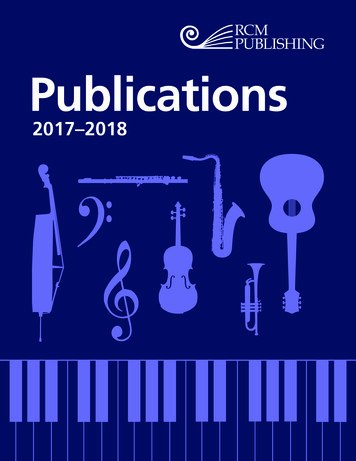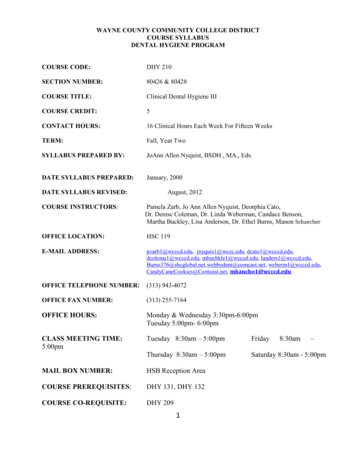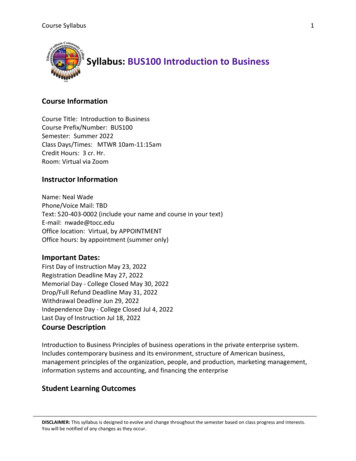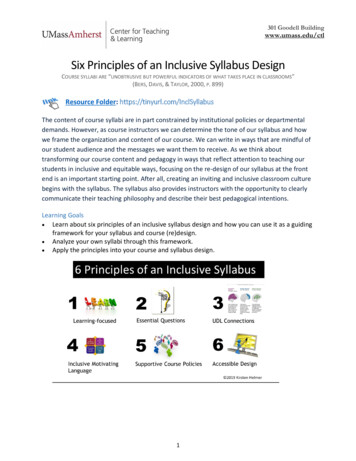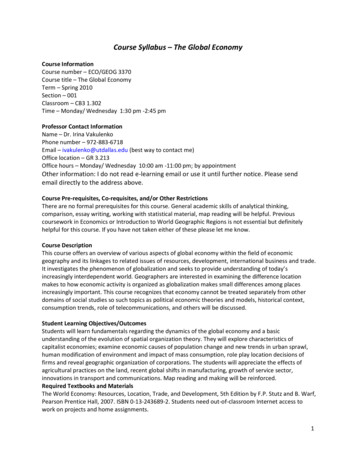
Transcription
Course Syllabus – The Global EconomyCourse InformationCourse number – ECO/GEOG 3370Course title – The Global EconomyTerm – Spring 2010Section – 001Classroom – CB3 1.302Time – Monday/ Wednesday 1:30 pm -2:45 pmProfessor Contact InformationName – Dr. Irina VakulenkoPhone number – 972-883-6718Email – ivakulenko@utdallas.edu (best way to contact me)Office location – GR 3.213Office hours – Monday/ Wednesday 10:00 am -11:00 pm; by appointmentOther information: I do not read e-learning email or use it until further notice. Please sendemail directly to the address above.Course Pre-requisites, Co-requisites, and/or Other RestrictionsThere are no formal prerequisites for this course. General academic skills of analytical thinking,comparison, essay writing, working with statistical material, map reading will be helpful. Previouscoursework in Economics or Introduction to World Geographic Regions is not essential but definitelyhelpful for this course. If you have not taken either of these please let me know.Course DescriptionThis course offers an overview of various aspects of global economy within the field of economicgeography and its linkages to related issues of resources, development, international business and trade.It investigates the phenomenon of globalization and seeks to provide understanding of today’sincreasingly interdependent world. Geographers are interested in examining the difference locationmakes to how economic activity is organized as globalization makes small differences among placesincreasingly important. This course recognizes that economy cannot be treated separately from otherdomains of social studies so such topics as political economic theories and models, historical context,consumption trends, role of telecommunications, and others will be discussed.Student Learning Objectives/OutcomesStudents will learn fundamentals regarding the dynamics of the global economy and a basicunderstanding of the evolution of spatial organization theory. They will explore characteristics ofcapitalist economies; examine economic causes of population change and new trends in urban sprawl,human modification of environment and impact of mass consumption, role play location decisions offirms and reveal geographic organization of corporations. The students will appreciate the effects ofagricultural practices on the land, recent global shifts in manufacturing, growth of service sector,innovations in transport and communications. Map reading and making will be reinforced.Required Textbooks and MaterialsThe World Economy: Resources, Location, Trade, and Development, 5th Edition by F.P. Stutz and B. Warf,Pearson Prentice Hall, 2007. ISBN 0-13-243689-2. Students need out-of-classroom Internet access towork on projects and home assignments.1
Suggested Course MaterialsStudents are expected to take notes during PowerPoint presentations and complete exercises andassignments before due dates. Lecture material shall be complimented by reading the appropriatechapters in the book. It is suggested that students make it a daily habit to read a reputable dailynewspaper online or in print. This will help relate learning with contemporary events and providedeeper understanding into class material.Assignments & Academic /10/10183/22/10TopicChapterIntroduction to Global Economy Course: Globalizationof Culture and Economy. IT and Globalization.Globalization vs. Diversity. 4 major Questions ofWorld Economy. Types of Political Economies.Historical Development of Capitalism: Emergence andNature. Industrial Revolution.Colonialism. Historiography of Conquest. CulturalWesternization.Theoretical Considerations. Factors of Location.Alfred Weber and location theory.Principals of Scale Economics, Industrial LocationTheory, Geographic Organization of Corporations.Test 1 – 20% of final gradeDemography: Population Change and Structure.Demographic Transition Theory.Migration and The Gravity Model. PopulationDistribution.Types of Resources and Their Limits. Resources andPopulation. Expanding Resource Base andIntensifying Productivity.Energy Resources: Production, Consumption,Alternatives. Human Modification of Environment.Agriculture. Land Use and Industrialization ofAgriculture. Systems of Agricultural Production.Farming in North America.The Nature of Manufacturing. Manufacturing in theUnited States. Globalization of Manufacturing.Product Cycles and Locational Adjustments.Information Technologies as a Part of ManufacturingEconomic Activity.Test 2 – 20% of final gradeServices and Forces Driving their Growth. LaborCharacteristics: Intensity, Composition, Education.Financial Services: Components, Regulations,Location, Technologies. Tourism.Transportation Networks in Historical Perspective.Transportation Costs and Policy. Personal Mobility inChapter 1Chapter 1Chapter 2Chapter 2Chapter 5Chapter 5Chapter 3Chapter 3Chapter 4Chapter 4Chapter 6Chapter 7Chapter 8Chapter 8Chapter 92
/3/10315/7/10 at11 amthe United States.Other Components of Infrastructure.Telecommunications and Geography. Impacts ofInformation Technologies.Cities as Reflection of Economic Development: fromFirst Cities to Global Cities. Intraurban SpatialOrganization.Urban Hierarchy. Sprawling Metropolis and Problemsof the U.S. City.Theoretical Perspective on Consumption.Geographies of Consumption. EnvironmentalDimensions of Consumption.Test 3 – 20% of final gradeNotions of Comparative and competitive advantage.International Money and capital markets.Barriers to International Trade and RegionalEconomic Integration. Lessons of Globalization.World Patterns of Trade. Role of The USA in theGlobal Trade. Emerging Markets and Global TradeFlows.Measurements and Geography of EconomicDevelopment. Major Theories: Modernization,Dependency, and World Systems.Characteristic Problems of Developed andUnderdeveloped Countries.“International Conference on Global Development “.Development Strategies.Review for the final exam.Chapter 9Chapter 10Chapter 10Chapter 11Chapter 12Chapter 12Chapter 13Chapter 14Essay is due - 15% offinal grade. All extrawork is due.Final Exam - 25% of final gradePerfect attendance adds 1 bonus point, perfect set ofnotes and classroom work – 1 bonus point towardyour Final Grade. Class participation by offeringproductive comments and knowledgeable insights isencouraged by 1 bonus point.Grading PolicyYou are required to complete all the assignments. Average of Test 1 and Test 2 will make your MidtermGrade to be posted on March 5, 2010. Each of 3 tests is 20% of total grade. Essay* is due on May 3 (15%of total grade). Essay topics are attached to the syllabus. One topic must be described in a 5-7 pagesessay (printed, double spaced with a cover page). It should include a definition of the problem and how itfits into a larger global issue. A few examples should be presented as to how such a problem is addressedin actual life in different countries that face it. Express your ideas about what must be done from aperspective both as a citizen and as an empowered leader to solve the problem and why you feel suchmeasures will have a positive outcome. The list of at least five sources is to be attached. Textbook mayprovide the initial idea about the problem but independent research and conclusions are assessed.3
The Final Exam on May 7, 2010 will make other 25% of your grade. All graded material will be assigneda numerical value on a scale of 100. Letter Grades are given as follows: 97% and over A ; 93% to 96% A ;90% to 92% A- ; 87% to 89% B ; 83% to 86% B; 80% to 82% B- ; 77% to 79%C ; 73% to 76% C ; 70% to72% C- ; 67% to 69% D ; 63% to 66% D ; 60% to 62% D; Less than 60% F.* Essay can be substituted by a 10 minutes long PowerPoint presentation on a related topic to be givenduring the class on a broader issue as an illustration of a general concept discussed in the class. Apresentation option MUST be discussed on an individual basis in advance to comply with the curriculumand be assigned a specific date.Course & Instructor PoliciesAttendance is crucial for the successful learning and will be taken each class. Many of my lectures andour discussions will include materials not found in the text. As a result a good set of class notes andcontour maps will be extremely helpful if plan excelling in this course. To claim a bonus point forclassroom work you need to have a perfect set of notes covering every topic discussed. If you missed aclass the notes should be made as you read the assigned chapter in the book.Attendance and class participation will be used as deciding factors for borderline students. No makeuptests. (Individual consideration may be given in case of overwhelming circumstances). Although extrahelp may be provided to students, the professor will not hold alternate lectures or release lecture notesto students. Respectful discussions of the topics being studied are encouraged.Field Trip Policies Not ApplicableOff-campus Instruction and Course Activities Not ApplicableOff-campus, out-of-state, and foreign instruction and activities are subject to state law and University policies andprocedures regarding travel and risk-related activities. Information regarding these rules and regulations may befound at the website address http://www.utdallas.edu/BusinessAffairs/Travel Risk Activities.htm. Additionalinformation is available from the office of the school dean. Below is a description of any travel and/or risk-relatedactivity associated with this course.Student Conduct & DisciplineThe University of Texas System and The University of Texas at Dallas have rules and regulations for the orderly andefficient conduct of their business. It is the responsibility of each student and each student organization to beknowledgeable about the rules and regulations which govern student conduct and activities. General informationon student conduct and discipline is contained in the UTD publication, A to Z Guide, which is provided to allregistered students each academic year.The University of Texas at Dallas administers student discipline within the procedures of recognized andestablished due process. Procedures are defined and described in the Rules and Regulations, Board of Regents,The University of Texas System, Part 1, Chapter VI, Section 3, and in Title V, Rules on Student Services and Activitiesof the university’s Handbook of Operating Procedures. Copies of these rules and regulations are available tostudents in the Office of the Dean of Students, where staff members are available to assist students in interpretingthe rules and regulations (SU 1.602, 972/883-6391).A student at the university neither loses the rights nor escapes the responsibilities of citizenship. He or she isexpected to obey federal, state, and local laws as well as the Regents’ Rules, university regulations, and4
administrative rules. Students are subject to discipline for violating the standards of conduct whether suchconduct takes place on or off campus, or whether civil or criminal penalties are also imposed for such conduct.Academic IntegrityThe faculty expects from its students a high level of responsibility and academic honesty. Because the value of anacademic degree depends upon the absolute integrity of the work done by the student for that degree, it isimperative that a student demonstrate a high standard of individual honor in his or her scholastic work.Scholastic dishonesty includes, but is not limited to, statements, acts or omissions related to applications forenrollment or the award of a degree, and/or the submission as one’s own work or material that is not one’sown. As a general rule, scholastic dishonesty involves one of the following acts: cheating, plagiarism, collusionand/or falsifying academic records. Students suspected of academic dishonesty are subject to disciplinaryproceedings.Plagiarism, especially from the web, from portions of papers for other classes, and from any other source isunacceptable and will be dealt with under the university’s policy on plagiarism (see general catalog fordetails). This course will use the resources of turnitin.com, which searches the web for possible plagiarism and isover 90% effective.Email UseThe University of Texas at Dallas recognizes the value and efficiency of communication between faculty/staff andstudents through electronic mail. At the same time, email raises some issues concerning security and the identityof each individual in an email exchange. The university encourages all official student email correspondence besent only to a student’s U.T. Dallas email address and that faculty and staff consider email from students officialonly if it originates from a UTD student account. This allows the university to maintain a high degree of confidencein the identity of all individual corresponding and the security of the transmitted information. UTD furnishes eachstudent with a free email account that is to be used in all communication with university personnel. TheDepartment of Information Resources at U.T. Dallas provides a method for students to have their U.T. Dallas mailforwarded to other accounts.Withdrawal from ClassThe administration of this institution has set deadlines for withdrawal of any college-level courses. These dates andtimes are published in that semester's course catalog. Administration procedures must be followed. It is thestudent's responsibility to handle withdrawal requirements from any class. In other words, I cannot drop orwithdraw any student. You must do the proper paperwork to ensure that you will not receive a final grade of "F" ina course if you choose not to attend the class once you are enrolled.Student Grievance ProceduresProcedures for student grievances are found in Title V, Rules on Student Services and Activities, of the university’sHandbook of Operating Procedures.In attempting to resolve any student grievance regarding grades, evaluations, or other fulfillments of academicresponsibility, it is the obligation of the student first to make a serious effort to resolve the matter with theinstructor, supervisor, administrator, or committee with whom the grievance originates (hereafter called “therespondent”). Individual faculty members retain primary responsibility for assigning grades and evaluations. If thematter cannot be resolved at that level, the grievance must be submitted in writing to the respondent with a copy5
of the respondent’s School Dean. If the matter is not resolved by the written response provided by the respondent,the student may submit a written appeal to the School Dean. If the grievance is not resolved by the School Dean’sdecision, the student may make a written appeal to the Dean of Graduate or Undergraduate Education, and thedeal will appoint and convene an Academic Appeals Panel. The decision of the Academic Appeals Panel isfinal. The results of the academic appeals process will be distributed to all involved parties.Copies of these rules and regulations are available to students in the Office of the Dean of Students, where staffmembers are available to assist students in interpreting the rules and regulations.Incomplete Grade PolicyAs per university policy, incomplete grades will be granted only for work unavoidably missed at the semester’s endand only if 70% of the course work has been completed. An incomplete grade must be resolved within eight (8)weeks from the first day of the subsequent long semester. If the required work to complete the course and toremove the incomplete grade is not submitted by the specified deadline, the incomplete grade is changedautomatically to a grade of F.Disability ServicesThe goal of Disability Services is to provide students with disabilities educational opportunities equal to those oftheir non-disabled peers. Disability Services is located in room 1.610 in the Student Union. Office hours areMonday and Thursday, 8:30 a.m. to 6:30 p.m.; Tuesday and Wednesday, 8:30 a.m. to 7:30 p.m.; and Friday, 8:30a.m. to 5:30 p.m.The contact information for the Office of Disability Services is:The University of Texas at Dallas, SU 22PO Box 830688Richardson, Texas 75083-0688(972) 883-2098 (voice or TTY)Essentially, the law requires that colleges and universities make those reasonable adjustments necessary toeliminate discrimination on the basis of disability. For example, it may be necessary to remove classroomprohibitions against tape recorders or animals (in the case of dog guides) for students who are blind. Occasionallyan assignment requirement may be substituted (for example, a research paper versus an oral presentation for astudent who is hearing impaired). Classes enrolled students with mobility impairments may have to berescheduled in accessible facilities. The college or university may need to provide special services such asregistration, note-taking, or mobility assistance.It is the student’s responsibility to notify his or her professors of the need for such an accommodation. DisabilityServices provides students with letters to present to faculty members to verify that the student has a disability andneeds accommodations. Individuals requiring special accommodation should contact the professor after class orduring office hours.Religious Holy DaysThe University of Texas at Dallas will excuse a student from class or other required activities for the travel to andobservance of a religious holy day for a religion whose places of worship are exempt from property tax underSection 11.20, Tax Code, Texas Code Annotated.6
The student is encouraged to notify the instructor or activity sponsor as soon as possible regarding the absence,preferably in advance of the assignment. The student, so excused, will be allowed to take the exam or completethe assignment within a reasonable time after the absence: a period equal to the length of the absence, up to amaximum of one week. A student who notifies the instructor and completes any missed exam or assignment maynot be penalized for the absence. A student who fails to complete the exam or assignment within the prescribedperiod may receive a failing grade for that exam or assignment.If a student or an instructor disagrees about the nature of the absence [i.e., for the purpose of observing a religiousholy day] or if there is similar disagreement about whether the student has been given a reasonable time tocomplete any missed assignments or examinations, either the student or the instructor may request a ruling fromthe chief executive officer of the institution, or his or her designee. The chief executive officer or designee musttake into account the legislative intent of TEC 51.911(b), and the student and instructor will abide by the decisionof the chief executive officer or designee.These descriptions and timelines are subject to change at the discretion of the Professor.List of Esssay/Presentation* Topics(chapter number is included after the .19.20.Role of MNC in the process of globalization (1).Affect of colonialism on the societies and geographies of the colonies (2).Affect of population size on economic development (3).Major consequences of international migration (3).Environmental consequences of high energy use (4).Main economic and social consequences of human modification of environment (4).Agricultural commodity prices in global economy (6).Major world industrial problems and approaches to their solution (7).Forms of technological change in services (8).Off-shore banking: winners and losers (8).Role of tourism in global economic integration (8).Role of technological revolution in transport and communications development (9).E-commerce: advantages and limitations (9).Economic and social impact of Internet in the global economy (9).Tale of two cities: in a developed and developing country (10).Major urban problems today, their causes and solutions (10).Rising levels of consumption make everybody happy: true or false? (11).Principal barriers to international business (12).Role of US dollar in the global economy (12).Benefits and short comings of regional economic integration (12).*Presentation options are available after first two weeks of classes (i.e. starting with Topic 3).7
Course Syllabus - The Global Economy Course Information Course number - ECO/GEOG 3370 Course title - The Global Economy Term - Spring 2010 Section - 001 Classroom - CB3 1.302 Time - Monday/ Wednesday 1:30 pm -2:45 pm Professor Contact Information Name - Dr. Irina Vakulenko Phone number - 972-883-6718



